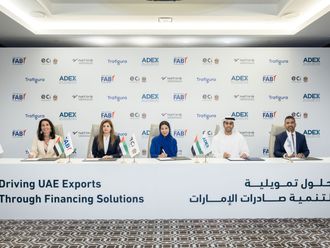
The UAE is no longer in “catch-up” mode but is instead leading the charge in implementing robust tax regulations, said Pratik Shah, Founder Partner of TMSL Management Consultancies, at the UAE Growth & Investment Forum, organised by Gulf News at the Godolphin Ballroom, Jumeirah Emirates Towers.
“The 9 per cent corporate tax isn’t just about paying taxes; it’s about compliance,” he said, adding that adhering to regulations is key to avoiding penalties.
Shah explored the dual role of government, noting that while businesses are expected to meet obligations, authorities provide clear benefits, including support systems that can enhance productivity. “It’s a two-sided issue,” he said. “On one side, the government offers benefits, and on the other, businesses must meet their obligations.”
Taking the audience on a journey through the UAE’s tax history, Shah highlighted major milestones such as the introduction of customs duties in 1983, excise taxes in 2017, and VAT in 2018. “We’ve seen the introduction of economic substance regulations in 2019, and transfer pricing has gained prominence with the recent implementation of corporate tax,” he explained.
One of the key points Shah drove home is that compliance must start even before a business files its first corporate tax return. “Businesses must retroactively ensure that their financial statements for 2022-2023 comply with transfer pricing regulations,” he noted, emphasising that this is crucial for the opening balance sheets for 2023.
Looking ahead, Shah pointed out that new regulations are on the horizon, including the OECD’s Pillar Two Initiative for large multinational corporations in 2025 and the introduction of e-invoicing mechanisms in 2026. “The UAE government is giving businesses ample time to prepare for these changes,” he said, praising the foresight that allows companies to adapt without disruption.
However, Shah cautioned that keeping up with these changes requires constant attention. “Since 2018, we’ve had over 370,000 VAT registrants in the UAE, and numerous public clarifications, court rulings, and decisions have shaped the tax landscape,” he said. The introduction of corporate tax comes with its own complexity — over 20 chapters and 70 articles, in addition to detailed public guides.
To ensure compliance, Shah identified four pillars businesses must focus on: people, processes, data, and technology. “Whether it’s managing employee policies or maintaining proper accounting records, every aspect of your business must be tax-compliant,” he advised.
One of the most overlooked areas is master data management, according to Shah. “Your vendor, customer, and product information must be correctly aligned from a tax perspective,” he explained. He warned that issuing incorrect tax invoices could result in penalties of Dh2,500 per document.
Shah also highlighted the UAE government’s efforts to integrate various agencies into the tax system, making compliance tracking more efficient. “If your trade license or passport information is not updated, you could face penalties of Dh20,000,” he said.
Shah advocated for businesses to embrace technology as a way to streamline operations. “Incorporating tax-compliant software will not only save time but reduce costs,” he said. With AI and automation becoming increasingly vital, he emphasised that staying ahead of technological advancements is critical for tax compliance.
Shah had a clear message for the audience: “Tax compliance isn’t just about registering on time or filing returns. It’s about integrating compliance into every process within your organisation.”
By doing so, businesses can avoid penalties and ensure they remain in sync with the UAE’s evolving tax landscape. “As long as businesses align with the laws of the land, they can enjoy a smoother, penalty-free operation,” he added.








